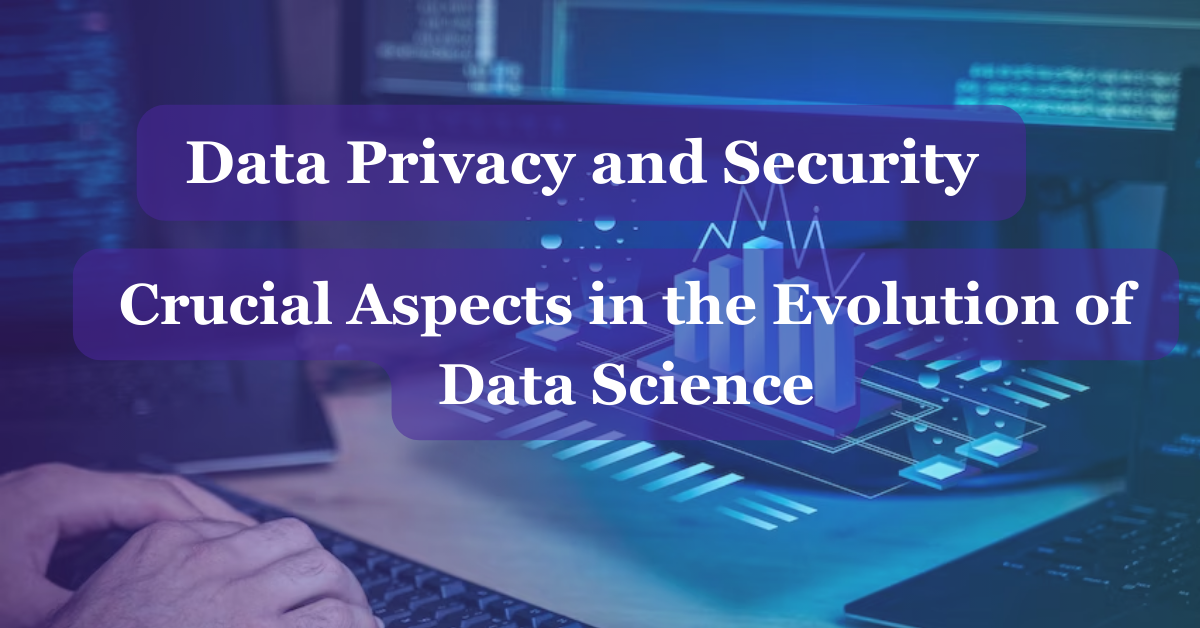Introduction
In
today's fast-paced digital era, where data serves as the lifeblood of
technological advancements, ensuring data privacy and security is more critical
than ever. As we delve into the evolution of data science, it becomes evident that safeguarding sensitive
information is a cornerstone for a secure and trustworthy digital landscape.
The Evolution of Data
Science
The
Emergence of Data Science:
Data
science, integrating statistical analysis, machine learning, and domain
expertise, has witnessed remarkable growth. The convergence of data science,
data analytics, and artificial intelligence has paved the way for
groundbreaking innovations.
Rapid
Growth and Technological Advancements:
The
evolution of data science has been propelled by rapid technological
advancements. Examples include data analytics, Machine Learning, Natural
Language Processing (NLP), Blockchain Analytics that have significantly contributed
to this growth.
Data Privacy Concerns
Risks
and Threats:
As
data becomes more valuable, the risks and threats to its privacy and security
escalate. Cybercriminals exploit vulnerabilities, leading to data breaches,
identity theft, and financial fraud.
High-Profile
Data Breaches:
Numerous
high-profile data breaches underscore the vulnerability of even the most robust
systems. The aftermath of such breaches emphasizes the need for robust data
security measures.
Legal
and Ethical Implications:
Data
privacy concerns extend beyond immediate financial losses. Legal and ethical
implications come to the forefront, urging organizations to establish stringent
data protection policies.
Security Measures in Data
Science
Encryption
Technologies:
Ensuring
the security of data in the realm of data science necessitates the active
implementation of encryption technologies. This is crucial for protecting data
both at rest and in transit. The incorporation of advanced encryption algorithms
serves as an additional layer of security, guarding against unauthorized
access.
Access
Control and Authentication:
Establishing
strict control over access to sensitive data via robust authentication
mechanisms ensures that only authorized personnel can view or modify the
information.
Regular
Security Audits:
Performing
routine security audits is essential for identifying vulnerabilities and
weaknesses within the current security infrastructure, enabling prompt
remediation.
Balancing Data Utilization
and Privacy
Challenges
in Striking the Right Balance:
Balancing
the utilization of data for innovation while respecting privacy is a delicate
challenge. Striking the right balance requires thoughtful consideration of
ethical and legal implications.
Ethical
Data Handling:
Adopting
ethical data handling practices involves transparent communication with users
about data collection and usage, empowering them to make informed decisions.
User
Education on Data Privacy:
Educating
users on data privacy empowers them to take an active role in safeguarding
their information. Awareness campaigns and user-friendly privacy settings
contribute to a privacy-conscious society.
Future Trends in Data
Security
Machine
Learning for Threat Detection:
The
integration of machine learning algorithms enhances threat detection
capabilities, enabling proactive responses to emerging cybersecurity threats.
Blockchain
Technology:
Blockchain
technology offers a decentralized and secure framework for data storage and
transactions, reducing the risk of unauthorized access.
Privacy-Preserving
Technologies:
Innovations
in privacy-preserving technologies, such as homomorphic encryption, enable data
analysis without exposing sensitive information.
The Intersection of Data
Science and User Privacy
Consumer
Awareness:
Raising
awareness among consumers about the importance of data privacy empowers them to
make informed choices regarding the services they use.
Corporate
Responsibility:
Companies
bear the responsibility of safeguarding user data. Ethical data practices
contribute to building trust and maintaining a positive corporate image.
Government
Regulations:
Government
regulations play a crucial role in establishing the legal framework for data
privacy. Compliance with these regulations is essential for businesses
operating in various jurisdictions.
Data Security Best Practices
Regular
Data Backups:
Regularly
backing up data ensures quick recovery in the event of a cyber incident or data
loss, minimizing downtime and potential financial losses.
Employee
Training on Cybersecurity:
Employee
training programs on cybersecurity best practices create a vigilant workforce
that recognizes and mitigates potential security threats.
Incident
Response Plans:
Developing
robust incident response plans enables organizations to react swiftly to
security incidents, minimizing the impact on data integrity and user trust.
Impact on Businesses and
Individuals
Financial
Implications:
Experiencing
data breaches can result in significant financial implications, including
expenses related to legal fees, regulatory fines, and the management of
reputational costs.
Trust
and Reputation:
Maintaining
data privacy and security directly impacts the trust and reputation of
businesses. A secure reputation attracts customers and partners.
Personal
Security Concerns:
Individuals
are increasingly concerned about the security of their personal information.
Safeguarding personal data is not only a legal requirement for businesses but
also a moral obligation.
Addressing Data Privacy
Challenges Globally
International
Cooperation:
Collaboration
between countries is crucial in addressing global data privacy challenges.
Shared best practices and standardized regulations contribute to a unified
approach.
Standardization
Efforts:
Standardization
efforts in data privacy facilitate consistency in practices, making it easier
for businesses to comply with varying regulations.
Cross-Border
Data Transfer Regulations:
With
the global nature of data exchange, regulations governing cross-border data
transfers are essential. Clear guidelines ensure lawful and secure data
transfer practices.
Case Studies
Successful
Data Security Implementations:
Examining
successful data security implementations provides valuable insights into
effective strategies and technologies.
Lessons
Learned from Data Breaches:
Analyzing
data breaches offers an opportunity to learn from mistakes, reinforcing the
importance of robust data security measures.
The Role of Data Scientists
in Ensuring Privacy
Ethical
Guidelines for Data Scientists:
Establishing
ethical guidelines for data scientists ensures responsible data collection,
analysis, and usage.
Responsible
Data Collection and Analysis:
Data
scientists play a pivotal role in ensuring that data is collected and analyzed
responsibly, without compromising individual privacy.
Continuous
Learning and Adaptation:
Given
the dynamic nature of data science and cybersecurity, continuous learning is
crucial for data scientists to stay ahead of evolving threats and adhere to
ethical guidelines.
Educating the Masses on Data
Privacy
School
Curriculum Integration:
Integrating
data privacy education into school curricula instills a sense of responsibility
and awareness from an early age.
Corporate
Training Programs:
Businesses
can contribute to data privacy education by implementing training programs for
employees, fostering a culture of security.
Public
Awareness Campaigns:
Public
awareness campaigns led by governments and non-profit organizations play a
crucial role in educating the masses on data privacy and security.
Future Challenges and
Solutions
Evolving
Threat Landscape:
As
technology evolves, so do cyber threats. Addressing the evolving threat
landscape requires continuous innovation and adaptive security measures.
Technological
Innovations for Enhanced Security:
Investing
in emerging technologies that enhance security, such as AI-driven threat
detection and quantum-resistant encryption, is crucial for staying ahead of
cyber threats.
Collaborative
Efforts for a Secure Digital Future:
Collaboration
between industry stakeholders, governments, and technology experts is essential
for developing comprehensive solutions that ensure a secure digital future.
Conclusion
The
growth of data science offers great
chances and challenges, especially in terms of keeping data private and secure.
Protecting sensitive information is not just a technical need but also a moral
duty for both businesses and individuals.
FAQ’S
1. Why is data privacy and security crucial in the evolution
of data science?
●
Data
privacy and security are vital as they ensure the protection of sensitive
information in the fast-paced digital era. With data being the lifeblood of
technological advancements, safeguarding it is fundamental for a secure and
trustworthy digital landscape.
2. How has the evolution of data science been propelled by
technological advancements?
●
The
evolution of data science has been accelerated by rapid technological
advancements, such as data security these advancements have allowed for the
integration of statistical analysis, machine learning, and domain expertise,
leading to groundbreaking innovations.
3. What are the key concerns regarding data privacy in the
current digital landscape?
●
Key
concerns include the escalating risks and threats to data privacy, with
cybercriminals exploiting vulnerabilities leading to data breaches, identity
theft, and financial fraud. Legal and ethical implications also become
prominent, urging organizations to establish stringent data protection
policies.
4. What security measures are essential in data science to
protect sensitive information?
●
Essential
security measures include implementing encryption technologies for data at rest
and in transit, robust access control and authentication mechanisms,
Additionally, performing periodic security audits helps pinpoint
vulnerabilities and weaknesses within the current infrastructure.
5. How can organizations balance data utilization for
innovation while respecting privacy?
●
Balancing
data utilization and privacy requires thoughtful consideration of ethical and
legal implications. Adopting ethical data handling practices, transparent
communication with users about data collection, and empowering users to make
informed decisions are crucial in striking the right balance.
6. What are the future trends in data security?
●
Future
trends include the integration of machine learning for threat detection, the
use of blockchain technology for decentralized and secure data storage, and
innovations in privacy-preserving technologies such as homomorphic encryption,
enabling data analysis without exposing sensitive information.
7. How do businesses and individuals get impacted by data
breaches?
●
Data
breaches can result in significant financial losses for businesses, including
legal fees, regulatory fines, and reputation management costs. For individuals,
there are growing concerns about the security of personal information, making
safeguarding personal data a legal requirement and a moral obligation for
businesses.
8. How can data scientists contribute to ensuring privacy?
●
Data
scientists can contribute by adhering to ethical guidelines for responsible
data collection, analysis, and usage. Continuous learning and adaptation are
crucial for data scientists to stay ahead of evolving threats and maintain
ethical standards.
9. What role do government regulations play in data privacy?
●
Government
regulations play a crucial role in establishing the legal framework for data
privacy. Compliance with these regulations is essential for businesses
operating in various jurisdictions, contributing to a secure and regulated
digital landscape.
10. How can individuals and organizations contribute to data
privacy education?
·
Individual and
organizations can contribute by raising awareness among consumers, implementing
employee training programs on cybersecurity best practices, integrating data
privacy education into school curricula, and supporting public awareness
campaigns led by governments and non-profit organizations.





